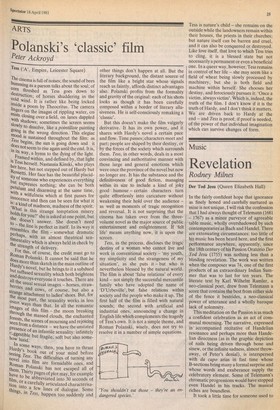ARTS
Polanski's 'classic' film
Peter Ackroyd
Tess ('A', Empire, Leicester Square) The cinema is full of noises; the sound of bees humming as a parson talks about the soul; of °cut threshed as Tess goes down to destruction; of horses shuddering in the op. Id wind. It is rather like being locked in. side a poem by Theocritus. The camera lingers on the images of rippling water, ofl. mists closing over a field, on lanes dappled With shadows; sometimes the screen seems slowly to dissolve, like a pointilliste painting going in the wrong direction. This elegiac mood is sustained throughout the film: as . Tess begins, the sun is going down and . does not seem to rise again until the end. It is, Its way, a hymn to the dying of the light. Framed within, and defined by, that light is Tess herself. Nastassia Kinski, who plays her here, has not stepped out of Hardy but Rossetti. Her face has the beautiful placidity0. f someone who experiences everything but expresses nothing; she can be both petuiant and disarming at the same time, With a wilfulness which at first passes for innocence and then can be seen for what it a kind of madness, madness of the spirit. What is this strange temptation misery holds for you?' she is asked at one point, but She doesn't answer. She doesn't need ' the,line is perfect in itself. In its,way it resembles the film somewhat dramatic Perhaps, with an almost theatrical sentimentality which is always held in check by the strength of delivery. For this, of course, the credit must go to Roman Polanski. It cannot be said that he ,_cloes more than sketch in the main outline of Hardy's novel, but he brings_ to it a subdued but suffused sexuality which both brightens and destroys everyone it touches. There are all the usual sexual images horses, strawberries and cows, of course, but also a strange attachment to ladies' shoes. But, for the most part, the sexuality works in less overt ways than that. In all the romantic images of this film the moon breaking through the massed clouds, the enchanted forests, the scenes of mourning and rejoicing seen from a distance we have the unstated Presence of an infantile sexuality: infinitely -ggestible but fragile, soft but also somehow lurid. In some ways, then, you have to thrust Hardy's book out of your mind before seeing Tess. The difficulties of turning any into nto film are formidable ones, and Roman Polanski has not escaped all of them. Thirty pages of plot may, for example h_ave to be abbreviated into 30 seconds of or a carefully articulated characterisa tioi n nto a few lines of dialogue. Some things, in Tess, happen too suddenly and other things don't happen at all. But the literary background, the distant source of the film like a bright star whose signals reach us faintly, affords distinct advantages also. Polanski profits from the formality and gravity of the original: each of his shots looks as though it has been carefully composed within a border of literary allusiveness. He is self-consciously remaking a 'classic'.
But this doesn't make the film vulgarly derivative. It has its own power, and it shares with Hardy's novel a certain pace and flow. Time passes; characters meet and part; people are shaped by their destiny, or by the forces of the society which surrounds them. Tess, in other words, deals in a most convincing and authoritative manner with those large and general emotions which were once the province of the novel but now no longer are. It has the substance and the definitiveness of good fiction, managing within its size to include a kind of joky good humour certain characters turn quite effortlessly into caricature without weakening their hold over the audience as well as moments of tragic recognition and reversal. It is not surprising that the cinema has taken over from the threevolume novel as the major source of public entertainment and enlightenment. If 'felt life' means anything now, it is upon the screen.
Tess, in the process, discloses the tragic destiny of a woman who cannot live and work in conventional society 'my youth, my simplicity and the strangeness of my situation', as she puts it but who is nevertheless blessed by the natural world. The film is about 'false relations' of every kind not simply the successful mercantile family who have adopted the name of 'D'Urbeville', but false relations within society and the people who make it up. The first half of the film is filled with natural sounds; the second with artificial and industrial ones, announcing a change in English life which complements the tragedy of Tess's own. It is not a simple theme, and Roman Polanski, wisely, does not try to resolve it in a number of simple equations. Tess is nature's child she remains on the outside while the landowners remain within their houses, the priests in their churches; but nature itself can be barren and cruel, and it can also be conquered or destroyed. Like love itself, that love to which Tess tries to cling, it is a blessed state but not necessarily a permanent or even a beneficial one. In a queer way, however, Tess remains in control of her life she may seem like a field of wheat being slowly processed by machinery, but she is both field and machine within herself. She chooses her destiny, and ferociously pursues it: 'Once a victim, always victim'. Which is, indeed, the truth of the film. I don't know if it is the truth of Hardy, and I don't think it matters. We are driven back to Hardy at the end and Tess is proof, if proof is needed, of the power of that individual imagination which can survive changes of form.






































 Previous page
Previous page